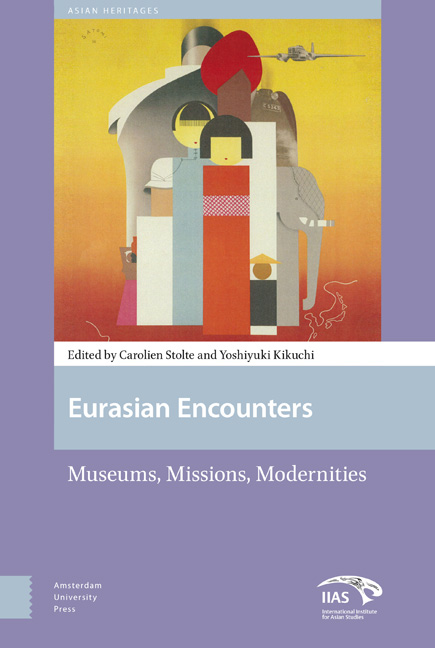Book contents
- Frontmatter
- Contents
- 1 Eurasian Encounters: Cross-border Intellectual and Cultural Exchange, 1900-1950
- Part I Artistic Spaces
- 2 The Museum at Aundh: Reflecting on Citizenship and the Art Museum in the Colony
- 3 Exhibiting the Nation: Cultural Flows, Transnational Exchanges, and the Development of Museums in Japan and China, 1900-1950
- 4 Parallel Tracks: Pan Yuliang and Amrita Sher-Gil in Paris
- 5 Bauhaus and Tea Ceremony: A Study of Mutual Impact in Design Education between Germany and Japan in the Interwar Period
- Part II Missions and Education
- 6 Schooling a Missionary in Early Twentieth-Century Eastern India
- 7 The Catholic Church in China in the First Half of the Twentieth Century: The Establishment of Zhendan University and Furen University
- Part III Shared Trajectories, New Subjectivities
- 8 Indigenizing Cosmopolitanism: Shifting Metropolitan Subjectivities in Twentieth-century Colombo
- 9 Fighting for the Soviet Empire: War Propaganda Production and Localized Discourses on Soviet Patriotism in Uzbekistan during the Second World War
- 10 Shared Origins, Shared Outcomes?: Transcultural Trajectories of Germany and Japan during the Asia-Pacific War
- Index
9 - Fighting for the Soviet Empire: War Propaganda Production and Localized Discourses on Soviet Patriotism in Uzbekistan during the Second World War
Published online by Cambridge University Press: 12 December 2020
- Frontmatter
- Contents
- 1 Eurasian Encounters: Cross-border Intellectual and Cultural Exchange, 1900-1950
- Part I Artistic Spaces
- 2 The Museum at Aundh: Reflecting on Citizenship and the Art Museum in the Colony
- 3 Exhibiting the Nation: Cultural Flows, Transnational Exchanges, and the Development of Museums in Japan and China, 1900-1950
- 4 Parallel Tracks: Pan Yuliang and Amrita Sher-Gil in Paris
- 5 Bauhaus and Tea Ceremony: A Study of Mutual Impact in Design Education between Germany and Japan in the Interwar Period
- Part II Missions and Education
- 6 Schooling a Missionary in Early Twentieth-Century Eastern India
- 7 The Catholic Church in China in the First Half of the Twentieth Century: The Establishment of Zhendan University and Furen University
- Part III Shared Trajectories, New Subjectivities
- 8 Indigenizing Cosmopolitanism: Shifting Metropolitan Subjectivities in Twentieth-century Colombo
- 9 Fighting for the Soviet Empire: War Propaganda Production and Localized Discourses on Soviet Patriotism in Uzbekistan during the Second World War
- 10 Shared Origins, Shared Outcomes?: Transcultural Trajectories of Germany and Japan during the Asia-Pacific War
- Index
Summary
Abstract
Cultural encounters between Soviet Europe and Soviet Asia during the Second World War had a significant influence on redefining the location of the Uzbek nation within the Soviet empire, as well as the location of the Soviet Union within the Uzbek nation. During the war, Moscow cultural elites were evacuated to Central Asia, while Central-Asian Red Army soldiers marched into battle. Due to this criss-crossed mobilization, the hierarchical centre-periphery relationship was interrupted as the Soviet authorities learned the importance of winning support from the Central- Asian periphery. Leading Uzbek intellectuals and Russian cultural elites were therefore assigned to promote Soviet patriotism among the local population. Together, they constructed heroic narratives for the Uzbek nation and (re)discovered the Uzbek people's pre-Revolutionary history, which sometimes contradicted Soviet ideology. Nevertheless, their collaborative efforts to localize Soviet war-propaganda messages added an Uzbek dimension to post-war Soviet identity, which contributed to the empire's weathering of the storm of decolonization in Asia.
The people called out: ‘Oh God,
Rescue us from those who came to save us.’
Hey sir, please tell me:
Who else is waiting for salvation from you?
[…]
But the East has its own defender,
A brother who rose up –
A true, selfless defender –
Who freed the East from the shackles of slavery
[…]
I am a son of my land, poet of the East
Foresight is my gift. More than once
my visions came to pass
as if fulfilling my mandates.
I am a free son of the Soviet East.
An Uzbek, who found happiness in creativity
My pen is given to me by Lenin –
A great leader and a great man.
G’afur G’ulom, Two Easts
In 1949, Uzbek poet G’afur G’ulom wrote Two Easts, a poem that compares Soviet Central Asia to the other Asia ‘outside the red bloc. To put the text into context, the other Asia was swept up in the surge of anti-colonial nationalism followed by a wave of decolonization that often escalated into violence. As Harry Gelber observes, for the European colonies in Asia and Africa fundamentally affected by Western modernization, ‘nationhood and statehood [were] the very conditions of independence and the principal way to make themselves heard in the world’.
- Type
- Chapter
- Information
- Eurasian EncountersMuseums, Missions, Modernities, pp. 207 - 230Publisher: Amsterdam University PressPrint publication year: 2017



